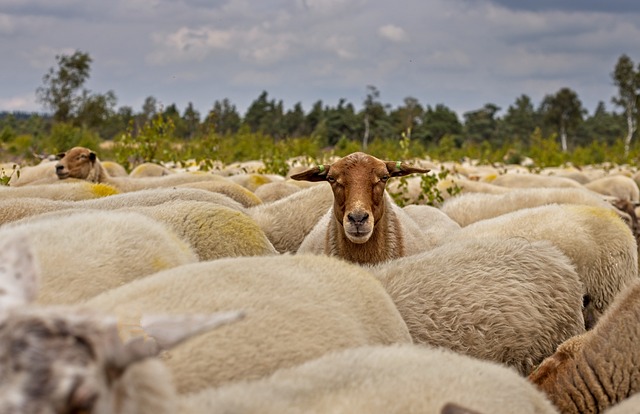In the Bible, sheep are often used as a symbol to represent believers and followers of God. They are seen as gentle, obedient, and in need of guidance and protection from their shepherd, who represents God or Jesus. Sheep are also used to symbolize purity, innocence, and sacrifice, as seen in the imagery of the sacrificial lamb in the Old Testament. Overall, the biblical meaning of a sheep emphasizes the importance of faith, humility, and reliance on God for guidance and protection.
Table of Contents
Shepherd and Sheep: Understanding the Relationship
Have you ever wondered why sheep are mentioned so frequently in the Bible? These gentle creatures hold a significant symbolic meaning in the scriptures, representing various aspects of our relationship with God. Let’s delve into the biblical symbolism of sheep and explore what it means for us as believers.
In the Bible, sheep are often used to symbolize believers and followers of God. Just as a shepherd cares for his flock, God watches over and guides His people. The image of a shepherd tending to his sheep is a powerful reminder of God’s love, protection, and provision for His children. As sheep rely on their shepherd for guidance and protection, so too do we rely on God for our every need.
The relationship between a shepherd and his sheep is one of trust and dependence. Sheep recognize the voice of their shepherd and follow him wherever he leads. In the same way, we are called to listen to God’s voice and trust in His guidance. When we stray from His path, He lovingly seeks us out and brings us back into His fold.
Sheep are also known for their gentle and docile nature. They are not aggressive or independent animals but instead rely on their shepherd for direction. This humility and submission are qualities that God desires in His children. As we surrender our will to His and trust in His plan for our lives, we can experience the peace and security that comes from being in His care.
In the Bible, Jesus is often referred to as the Good Shepherd who lays down His life for His sheep. This sacrificial love is a powerful example of the depth of God’s love for us. Just as a shepherd is willing to risk his life to protect his flock, so too did Jesus give His life to save us from sin and death. This act of love and redemption is a central theme in the Christian faith and serves as a reminder of the lengths to which God will go to save His people.
As believers, we are called to follow the example of Jesus and care for one another as members of the same flock. Just as a shepherd tends to his sheep, we are called to love, support, and encourage one another in our faith journey. By showing compassion and kindness to those around us, we reflect the love of God and fulfill His command to love our neighbors as ourselves.
In conclusion, the biblical symbolism of sheep serves as a powerful reminder of our relationship with God and our dependence on Him for guidance and protection. Just as a shepherd cares for his flock, so too does God watch over and guide His people with love and compassion. As we embrace our role as sheep in God’s flock, may we trust in His provision, follow His lead, and show love and kindness to one another as members of the same family.
The Lost Sheep: Parable of God’s Unconditional Love
Have you ever wondered why sheep are mentioned so frequently in the Bible? These gentle creatures hold a special significance in the scriptures, symbolizing various aspects of our relationship with God. Let’s delve into the biblical meaning of a sheep and explore the rich symbolism associated with these animals.
In the Bible, sheep are often used to represent believers or followers of God. Just as a shepherd cares for his flock, God watches over and guides his people. The image of a shepherd tending to his sheep is a powerful metaphor for God’s love and protection. In the book of Psalms, we read, “The Lord is my shepherd; I shall not want.” This verse highlights the intimate relationship between God and his followers, emphasizing his provision and care.
One of the most well-known parables involving sheep is the story of the lost sheep. In this parable, Jesus tells of a shepherd who leaves his ninety-nine sheep to search for the one that has wandered off. When he finds the lost sheep, he rejoices and brings it back to the fold. This parable illustrates God’s unwavering love and concern for each of his children. No matter how lost or wayward we may feel, God is always ready to welcome us back into his loving embrace.
The lost sheep also serves as a reminder of our own tendency to stray from God’s path. Just like the wandering sheep, we can easily become distracted or led astray by the temptations of the world. But no matter how far we may wander, God is always there, ready to lead us back to safety. His love is unconditional and unending, always seeking to bring us back into his fold.
Another important aspect of sheep symbolism in the Bible is the sacrificial nature of these animals. In the Old Testament, sheep were often used as offerings to atone for sin. The shedding of blood was seen as a necessary sacrifice to cleanse the people of their transgressions. This sacrificial imagery points to the ultimate sacrifice of Jesus Christ, who gave his life to redeem humanity from sin. Just as the blood of the sacrificial lamb brought forgiveness and reconciliation, so too does the blood of Christ offer salvation to all who believe.
The image of Jesus as the “Lamb of God” is a powerful symbol of his sacrificial love for humanity. In the book of John, we read, “Behold, the Lamb of God, who takes away the sin of the world.” This verse encapsulates the essence of Christ’s mission on earth – to offer himself as a perfect sacrifice for the sins of humanity. Through his death and resurrection, Jesus has provided a way for us to be reconciled to God and receive eternal life.
In conclusion, the biblical symbolism of a sheep is rich and multifaceted, representing God’s love, protection, and sacrifice. As believers, we are called to follow the example of the sheep – to trust in God’s guidance, to return to him when we stray, and to accept the sacrificial love of Jesus Christ. May we always remember the profound significance of the sheep in the scriptures and strive to live out its lessons in our own lives.
Sheep and Goats: The Importance of Obedience in Biblical Teachings

Have you ever wondered why sheep are mentioned so frequently in the Bible? These gentle creatures hold a significant symbolic meaning in biblical teachings, representing obedience, humility, and dependence on God. Let’s delve into the biblical symbolism of sheep and explore the importance of obedience in the context of sheep and goats.
In the Bible, sheep are often used as a metaphor for God’s people. Just as a shepherd cares for his flock, God watches over and guides His followers. Psalm 23 beautifully illustrates this relationship, with the Lord portrayed as a shepherd leading His sheep to green pastures and still waters. This imagery highlights the trust and dependence that believers should have in God, much like sheep rely on their shepherd for protection and provision.
The concept of obedience is closely tied to the symbolism of sheep in the Bible. Just as sheep follow their shepherd’s voice and instructions, Christians are called to obey God’s commandments and teachings. Jesus referred to Himself as the Good Shepherd who lays down His life for His sheep, emphasizing the sacrificial love and care that He has for His followers. By obeying His word and following His example, believers demonstrate their love and devotion to God.
In Matthew 25, Jesus tells a parable about the separation of sheep and goats, symbolizing the final judgment of humanity. The sheep, representing the righteous, are commended for their acts of kindness and compassion towards others. They are rewarded for feeding the hungry, clothing the naked, and caring for the sick, demonstrating their obedience to God’s command to love their neighbors as themselves. In contrast, the goats, symbolizing the unrighteous, are condemned for neglecting those in need and failing to show compassion. This parable serves as a powerful reminder of the importance of obedience in living out the teachings of Jesus.
The biblical symbolism of sheep also extends to the concept of humility. Sheep are known for their meek and gentle nature, traits that are valued in the Christian faith. In the Beatitudes, Jesus blesses the meek, declaring that they will inherit the earth. This emphasis on humility reflects the importance of putting others before oneself and recognizing one’s dependence on God for strength and guidance. Just as sheep rely on their shepherd for protection and direction, believers are called to humble themselves before God and trust in His providence.
As we reflect on the biblical symbolism of sheep, we are reminded of the profound lessons that these gentle creatures can teach us. From obedience and humility to dependence on God, the imagery of sheep in the Bible serves as a powerful reminder of the values and virtues that Christians are called to embody. By following the example of the Good Shepherd and living out His teachings, believers can experience the abundant life that He promises to those who faithfully follow Him.
In conclusion, the biblical symbolism of sheep offers a rich tapestry of meaning that speaks to the core values of the Christian faith. Through their obedience, humility, and dependence on God, believers can strive to emulate the qualities of these gentle creatures and experience the abundant life that comes from following the Good Shepherd. May we all seek to be like sheep in our faith journey, trusting in God’s guidance and living out His teachings with love and compassion towards others.
The Lamb of God: Jesus as the Ultimate Sacrifice
Have you ever wondered why sheep are mentioned so frequently in the Bible? These gentle creatures hold a significant symbolic meaning in the Christian faith, representing qualities such as innocence, purity, and obedience. In the Bible, sheep are often used to illustrate important spiritual truths, with Jesus himself being referred to as the “Lamb of God.” Let’s delve into the biblical symbolism of sheep and explore what it means for believers today.
In the Old Testament, sheep were commonly used as sacrificial animals in religious ceremonies. The blood of a spotless lamb was offered as atonement for sin, symbolizing the need for a perfect sacrifice to cleanse humanity of its transgressions. This practice foreshadowed the ultimate sacrifice that Jesus would make on the cross, shedding his blood to redeem mankind from sin and death.
Jesus is often referred to as the “Lamb of God” in the New Testament, emphasizing his role as the ultimate sacrifice for the sins of the world. Just as a lamb is innocent and pure, Jesus was without sin, making him the perfect offering to reconcile humanity with God. His sacrificial death on the cross served as a fulfillment of the Old Testament prophecies and a demonstration of God’s love and mercy towards his creation.
The imagery of sheep and shepherds is also prevalent throughout the Bible, with God often being likened to a shepherd who cares for his flock. In Psalm 23, David poetically describes God as his shepherd, guiding him through life’s trials and providing for his needs. Jesus himself referred to himself as the Good Shepherd who lays down his life for his sheep, demonstrating his deep love and commitment to his followers.
As believers, we are called to emulate the qualities of sheep in our relationship with God. Just as sheep trust their shepherd to lead and protect them, we are called to trust in God’s guidance and provision for our lives. We are called to be obedient to his word, following his commandments and living in a way that honors him. Like sheep who rely on their shepherd for sustenance, we are called to depend on God for our daily needs and to seek his presence in times of trouble.
The biblical symbolism of sheep reminds us of our need for a Savior and our dependence on God’s grace and mercy. Just as a shepherd cares for his flock, God watches over us with love and compassion, guiding us through life’s challenges and leading us towards eternal life. The image of Jesus as the Lamb of God serves as a powerful reminder of his sacrificial love for us and the redemption that is available through his death and resurrection.
In conclusion, the biblical symbolism of sheep holds deep spiritual significance for believers, reminding us of our need for a Savior and our dependence on God’s grace. Jesus, as the ultimate sacrifice and the Good Shepherd, exemplifies the qualities of innocence, purity, and obedience that we are called to embody in our walk with God. May we strive to follow his example and trust in his provision, knowing that he is always watching over us with love and care.
Sheep in the Book of Revelation: Symbolism of the Flock in End Times
Have you ever wondered about the significance of sheep in the Bible? Throughout the scriptures, sheep are used as a powerful symbol to convey various spiritual truths and lessons. In the Book of Revelation, the imagery of sheep is particularly significant, representing the flock of believers who follow and trust in the Good Shepherd, Jesus Christ.
In Revelation 7:17, we see a beautiful depiction of the flock of believers who have been redeemed by the blood of the Lamb. They are described as being led by the Good Shepherd to springs of living water, symbolizing eternal life and spiritual nourishment. This imagery of the flock being cared for and guided by the Shepherd is a powerful reminder of the love and protection that God provides for His people.
Throughout the Book of Revelation, sheep are also used to symbolize the faithful followers of Christ who will be victorious in the end times. In Revelation 14:4, we read about the 144,000 who are sealed by God and are described as being blameless and pure. These are the faithful believers who have remained true to their faith in the midst of trials and tribulations, and who will ultimately be victorious over the forces of evil.
The imagery of sheep in the Book of Revelation serves as a reminder of the importance of faithfulness and perseverance in the face of adversity. Just as a shepherd cares for his flock and protects them from harm, so too does God watch over His people and provide for their needs. The symbolism of the flock of believers in Revelation serves as a powerful encouragement to remain steadfast in our faith and trust in God’s promises, even in the midst of difficult circumstances.
In Revelation 19:7-9, we see the image of the marriage supper of the Lamb, where the bride of Christ is united with her bridegroom in a joyous celebration. This imagery of the wedding feast symbolizes the ultimate union between Christ and His church, where believers will be united with their Savior for all eternity. The sheep in this passage represent the faithful followers of Christ who have been redeemed by His blood and who will share in the joy of the marriage supper of the Lamb.
As we reflect on the symbolism of sheep in the Book of Revelation, we are reminded of the deep love and care that God has for His people. Just as a shepherd watches over his flock and leads them to safety, so too does God guide and protect His children through the trials and tribulations of life. The imagery of the flock of believers in Revelation serves as a powerful reminder of the faithfulness and love that God has for His people, and the ultimate victory that awaits those who remain faithful to Him.
In conclusion, the symbolism of sheep in the Book of Revelation serves as a powerful reminder of the love and care that God has for His people. The imagery of the flock of believers who follow and trust in the Good Shepherd serves as a powerful encouragement to remain steadfast in our faith and trust in God’s promises, even in the midst of difficult circumstances. Just as a shepherd cares for his flock and protects them from harm, so too does God watch over His people and provide for their needs. The symbolism of the flock of believers in Revelation serves as a powerful reminder of the faithfulness and love that God has for His people, and the ultimate victory that awaits those who remain faithful to Him.
Conclusion
In the Bible, sheep are often used as a symbol of followers of God, who are in need of guidance and protection from their shepherd, who represents God or Jesus. Sheep are also seen as innocent and meek creatures, reflecting the qualities of humility and obedience that believers should strive for in their relationship with God. Overall, the biblical meaning of a sheep emphasizes the importance of faith, trust, and dependence on God for guidance and protection.
For licensing reasons, we must provide the following notice: This content was created in part with the help of an AI.


